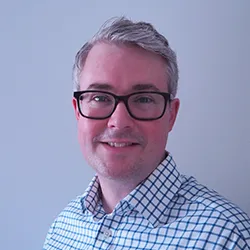
Dr Mark Ainslie is a Lecturer in Engineering. His research covers a broad range of aspects of applied superconductivity - materials that conduct direct current electricity without energy loss when cooled below a critical temperature. He's primarily focused on solving technical challenges related to high-field magnets, superconducting electric machines and other superconducting power applications.
His research brings together state-of-the-art materials and applied research, from fundamental materials science to numerical modelling to application design/testing.
What first attracted you to the field of engineering?
I have always been interested in the sciences – in particular, physics, as a way of explaining the world around us. From a young age, I also had an interest in and talent for maths. Engineering is the application of maths and physics to solve real-world problems and this sense of ‘being useful’ brings additional motivation and satisfaction.
As a young adult, I felt a sense of awe when learning about large-scale engineering projects: bringing together different technical abilities and talents to solve a problem, and the results can be spectacular.
What do you think is the biggest misconception people have about engineering?
I think one misconception is that the work of an engineer is not creative or that our work is boring. As a researcher in engineering, we are pushing the boundaries of knowledge and developing technology that may not actually be seen for several years or even decades. While we must think logically and critically, with an attention to detail, there is often a lot of creative and abstract thinking needed to solve the problems we’re faced with.
Personally speaking, my friends and family assume that because I’m an engineer I’m more practical than I actually am. Having specialised in electrical engineering, I’m often asked “can you wire up this up for me?” or to install a new electrical socket. I fear I might actually put them in a worse position for me having attempted to do so!
Engineering at King’s is inherently multidisciplinary. Can you give an example of a project you worked on, where working across disciplines was key to its success?
I’m fortunate to work in the research field of applied superconductivity, which is highly multidisciplinary by nature. Superconductors must be cooled to cryogenic temperatures for them to exhibit their remarkable material properties, and the physics behind these properties is complex. So successful projects arise from bringing together a range of researchers – materials scientists, physicists and engineers – across a broad range of areas – electrical, mechanical, thermodynamics, cryogenics and so on.
One example of a very successful project I was involved in, while a Research Fellow at the University of Cambridge, was the achievement of the Guinness World Record for the strongest magnetic field trapped in a superconductor. In collaboration with experts from the National High Magnetic Field Lab in the US and from Boeing (our industrial partner), we managed to overcome an issue with the brittle, mechanical nature of our superconductors that was causing catastrophic failure of our samples when we tried to magnetise them with very high magnetic fields.
What advice would you give to someone considering studying engineering?
If you have a flair for maths and physics, but also want to make a useful, practical contribution to the world around you, an engineering career is an excellent option. For engineering studies, it is really important to have a solid background in maths and physics.
General engineering courses, like ours at King’s, are a great place to start if you’re unsure about any particular specialism you’re interested in. Engineering courses not only teach you many useful technical concepts and skills, they teach you other ‘soft’ skills, like time and project management, communication (written and verbal), teamwork, problem solving, critical thinking, attention to detail and creativity. These skills are all highly valued by employers.
Aside from engineering, what do you do in your spare time?
One big passion I have is the Japanese language and culture. In my spare time, I watch Japanese TV shows and movies, and love to eat and cook Japanese food.
I studied Japanese during my undergraduate degree, and was fortunate to receive a Japanese government scholarship to do a Master’s degree in Electrical Engineering at the University of Tokyo and lived in Tokyo for almost three years. These experiences were amazing, and shaped me as the person I am today.
I also love travelling, eating and drinking nice things (I have an extensive wine and whisky collection at home.) As well as reading (although I purchase more books than I actually read)!